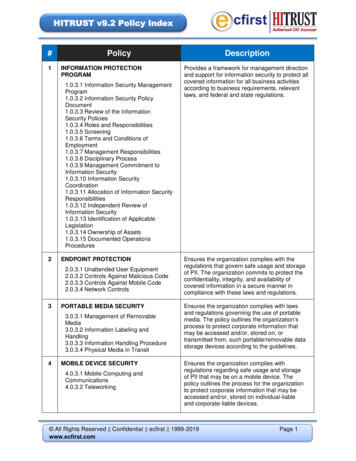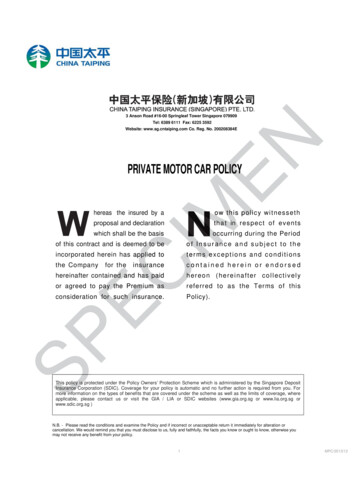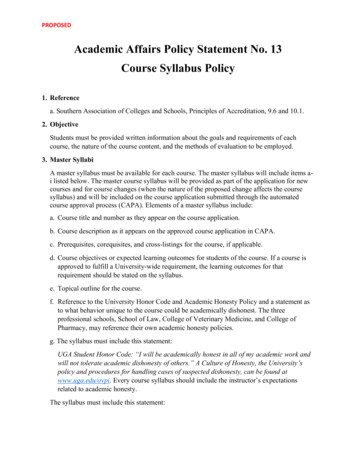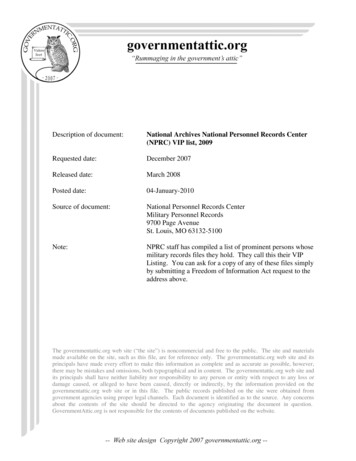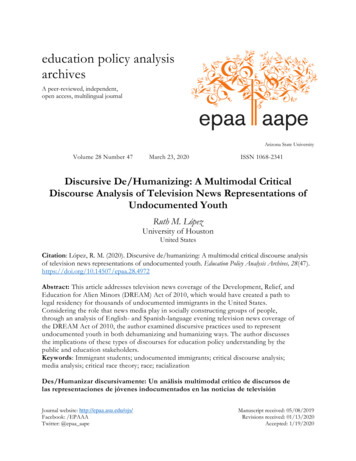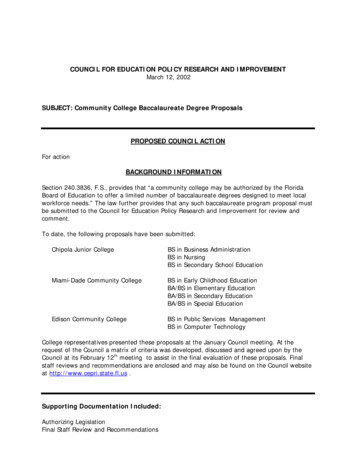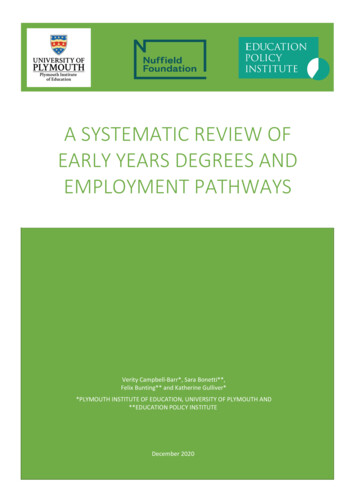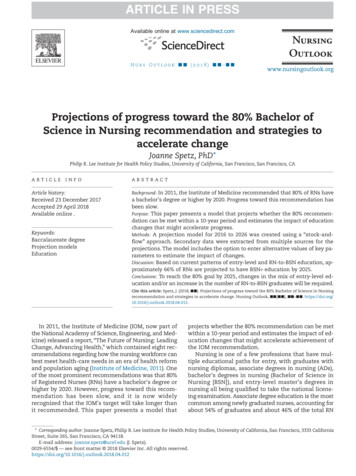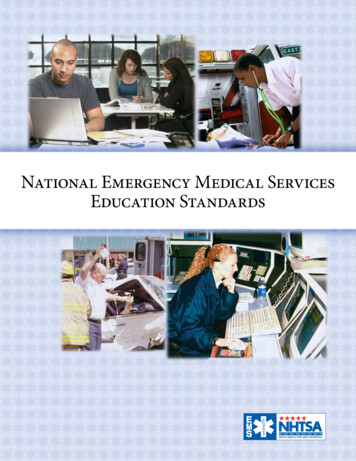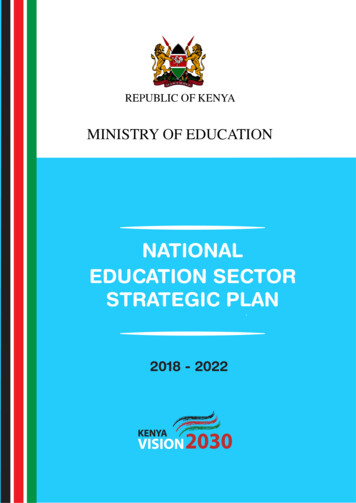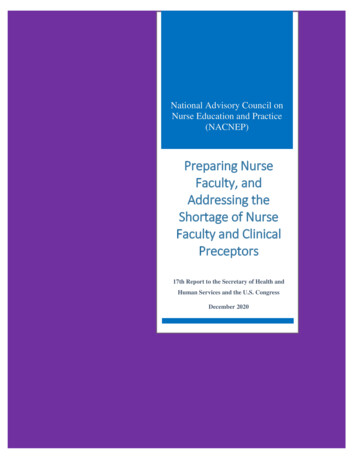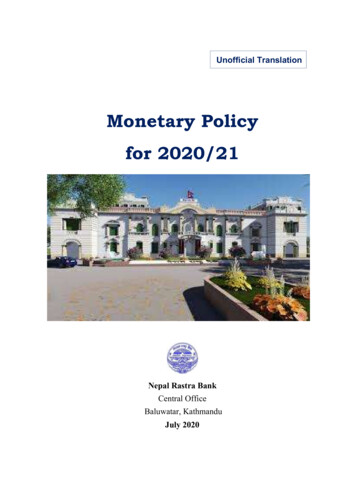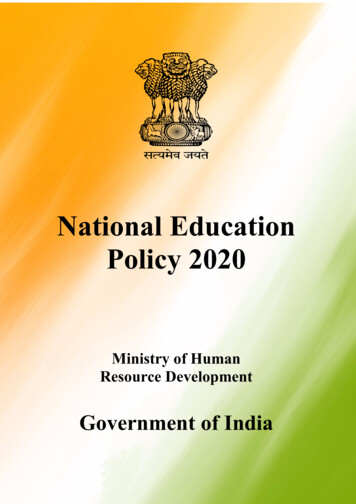
Transcription
YNational EducationPolicy 2020Ministry of HumanResource DevelopmentGovernment of India1
Chapter ContentsPageNoIntroduction3PART I. SCHOOL EDUCATION1Early Childhood Care and Education: The Foundation of Learning72Foundational Literacy and Numeracy: An Urgent & NecessaryPrerequisite to Learning83Curtailing Dropout Rates and Ensuring Universal Access to Education atAll Levels104Curriculum and Pedagogy in Schools: Learning Should be Holistic,Integrated, Enjoyable and Engaging115Teachers206Equitable and Inclusive Educa4tion: Learning for All247Efficient Resourcing and Effective Governance through SchoolComplexes/Clusters288Standard-setting and Accreditation for School Education30PART II. HIGHER EDUCATION9Quality Universities and Colleges: A New and Forward-looking Visionfor India’s Higher Education System3310Institutional Restructuring and Consolidation3411Towards a More Holistic and Multidisciplinary Education3612Optimal Learning Environments and Support for Students3813Motivated, Energized and Capable Faculty4014Equity and Inclusion in Higher Education4115Teacher Education4216Re-imagining Vocational Education4317Catalyzing Quality Academic Research in all Fields through a NewNational Research Foundation4518Transforming the Regulatory System of Higher Education461
National Education Policy 202019Effective Governance and Leadership for Higher Education Institutions49PART III. OTHER KEY AREAS OF FOCUS20Professional Education5021Adult Education and Life Long Learning5122Promotion of Indian Languages, Arts and Culture5323Technology Use and Integration5624Online and Digital Education: Ensuring Equitable Use of Technology58PART IV. MAKING IT HAPPEN25Strengthening the Central Advisory Board of Education6026Financing: Affordable and Quality Education for All6027Implementation61List of Abbreviations used632
National Education Policy 2020IntroductionEducation is fundamental for achieving full human potential, developing an equitable and justsociety, and promoting national development. Providing universal access to quality education is thekey to India’s continued ascent, and leadership on the global stage in terms of economic growth,social justice and equality, scientific advancement, national integration, and cultural preservation.Universal high-quality education is the best way forward for developing and maximizing ourcountry's rich talents and resources for the good of the individual, the society, the country, and theworld. India will have the highest population of young people in the world over the next decade, andour ability to provide high-quality educational opportunities to them will determine the future of ourcountry.The global education development agenda reflected in the Goal 4 (SDG4) of the 2030 Agenda forSustainable Development, adopted by India in 2015 - seeks to “ensure inclusive and equitable qualityeducation and promote lifelong learning opportunities for all” by 2030. Such a lofty goal will requirethe entire education system to be reconfigured to support and foster learning, so that all of the criticaltargets and goals (SDGs) of the 2030 Agenda for Sustainable Development can be achieved.The world is undergoing rapid changes in the knowledge landscape. With various dramatic scientificand technological advances, such as the rise of big data, machine learning, and artificial intelligence,many unskilled jobs worldwide may be taken over by machines, while the need for a skilledworkforce, particularly involving mathematics, computer science, and data science, in conjunctionwith multidisciplinary abilities across the sciences, social sciences, and humanities, will beincreasingly in greater demand. With climate change, increasing pollution, and depleting naturalresources, there will be a sizeable shift in how we meet the world’s energy, water, food, andsanitation needs, again resulting in the need for new skilled labour, particularly in biology, chemistry,physics, agriculture, climate science, and social science. The growing emergence of epidemics andpandemics will also call for collaborative research in infectious disease management anddevelopment of vaccines and the resultant social issues heightens the need for multidisciplinarylearning. There will be a growing demand for humanities and art, as India moves towards becoming adeveloped country as well as among the three largest economies in the world.Indeed, with the quickly changing employment landscape and global ecosystem, it is becomingincreasingly critical that children not only learn, but more importantly learn how to learn. Educationthus, must move towards less content, and more towards learning about how to think critically andsolve problems, how to be creative and multidisciplinary, and how to innovate, adapt, and absorb newmaterial in novel and changing fields. Pedagogy must evolve to make education more experiential,holistic, integrated, inquiry-driven, discovery-oriented, learner-centred, discussion-based, flexible,and, of course, enjoyable. The curriculum must include basic arts, crafts, humanities, games, sportsand fitness, languages, literature, culture, and values, in addition to science and mathematics, todevelop all aspects and capabilities of learners; and make education more well-rounded, useful, andfulfilling to the learner. Education must build character, enable learners to be ethical, rational,compassionate, and caring, while at the same time prepare them for gainful, fulfilling employment.The gap between the current state of learning outcomes and what is required must be bridged throughundertaking major reforms that bring the highest quality, equity, and integrity into the system, fromearly childhood care and education through higher education.The aim must be for India to have an education system by 2040 that is second to none, with equitableaccess to the highest-quality education for all learners regardless of social or economic background.This National Education Policy 2020 is the first education policy of the 21st century and aims toaddress the many growing developmental imperatives of our country. This Policy proposes therevision and revamping of all aspects of the education structure, including its regulation andgovernance, to create a new system that is aligned with the aspirational goals of 21st centuryeducation, including SDG4, while building upon India’s traditions and value systems. The National3
National Education Policy 2020Education Policy lays particular emphasis on the development of the creative potential of eachindividual. It is based on the principle that education must develop not only cognitive capacities both the ‘foundational capacities ’of literacy and numeracy and ‘higher-order’ cognitive capacities,such as critical thinking and problem solving – but also social, ethical, and emotional capacities anddispositions.The rich heritage of ancient and eternal Indian knowledge and thought has been a guiding light forthis Policy. The pursuit of knowledge (Jnan), wisdom (Pragyaa), and truth (Satya) was alwaysconsidered in Indian thought and philosophy as the highest human goal. The aim of education inancient India was not just the acquisition of knowledge as preparation for life in this world, or lifebeyond schooling, but for the complete realization and liberation of the self. World-class institutionsof ancient India such as Takshashila, Nalanda,Vikramshila, Vallabhi, set the highest standards ofmultidisciplinary teaching and research and hosted scholars and students from across backgroundsand countries. The Indian education system produced great scholars such as Charaka, Susruta,Aryabhata, Varahamihira, Bhaskaracharya, Brahmagupta, Chanakya, Chakrapani Datta, Madhava,Panini, Patanjali, Nagarjuna, Gautama, Pingala, Sankardev, Maitreyi, Gargi and Thiruvalluvar,among numerous others, who made seminal contributions to world knowledge in diverse fields suchas mathematics, astronomy, metallurgy, medical science and surgery, civil engineering, architecture,shipbuilding and navigation, yoga, fine arts, chess, and more. Indian culture and philosophy have hada strong influence on the world. These rich legacies to world heritage must not only be nurtured andpreserved for posterity but also researched, enhanced, and put to new uses through our educationsystem.The teacher must be at the centre of the fundamental reforms in the education system. The neweducation policy must help re-establish teachers, at all levels, as the most respected and essentialmembers of our society, because they truly shape our next generation of citizens. It must doeverything to empower teachers and help them to do their job as effectively as possible. The neweducation policy must help recruit the very best and brightest to enter the teaching profession at alllevels, by ensuring livelihood, respect, dignity, and autonomy, while also instilling in the systembasic methods of quality control and accountability.The new education policy must provide to all students, irrespective of their place of residence, aquality education system, with particular focus on historically marginalized, disadvantaged, andunderrepresented groups. Education is a great leveler and is the best tool for achieving economic andsocial mobility, inclusion, and equality. Initiatives must be in place to ensure that all students fromsuch groups, despite inherent obstacles, are provided various targeted opportunities to enter and excelin the educational system.These elements must be incorporated taking into account the local and global needs of the country,and with a respect for and deference to its rich diversity and culture. Instilling knowledge of India andits varied social, cultural, and technological needs, its inimitable artistic, language, and knowledgetraditions, and its strong ethics in India’s young people is considered critical for purposes of nationalpride, self-confidence, self-knowledge, cooperation, and integration.Previous PoliciesThe implementation of previous policies on education has focused largely on issues of access andequity. The unfinished agenda of the National Policy on Education 1986, modified in 1992 (NPE1986/92), is appropriately dealt with in this Policy. A major development since the last Policy of1986/92 has been the Right of Children to Free and Compulsory Education Act 2009 which laiddown legal underpinnings for achieving universal elementary education.Principles of this PolicyThe purpose of the education system is to develop good human beings capable of rational thoughtand action, possessing compassion and empathy, courage and resilience, scientific temper and4
National Education Policy 2020creative imagination, with sound ethical moorings and values. It aims at producing engaged,productive, and contributing citizens for building an equitable, inclusive, and plural society asenvisaged by our Constitution.A good education institution is one in which every student feels welcomed and cared for, where asafe and stimulating learning environment exists, where a wide range of learning experiences areoffered, and where good physical infrastructure and appropriate resources conducive to learning areavailable to all students. Attaining these qualities must be the goal of every educational institution.However, at the same time, there must also be seamless integration and coordination acrossinstitutions and across all stages of education.The fundamental principles that will guide both the education system at large, as well as theindividual institutions within it are: recognizing, identifying, and fostering the unique capabilities of each student, bysensitizing teachers as well as parents to promote each student’s holistic development in bothacademic and non-academic spheres; according the highest priority to achieving Foundational Literacy and Numeracy by allstudents by Grade 3; flexibility, so that learners have the ability to choose their learning trajectories and programmes,and thereby choose their own paths in life according to their talents and interests; no hard separations between arts and sciences, between curricular and extra-curricularactivities, between vocational and academic streams, etc. in order to eliminate harmfulhierarchies among, and silos between different areas of learning; multidisciplinarity and a holistic education across the sciences, social sciences, arts,humanities, and sports for a multidisciplinary world in order to ensure the unity and integrityof all knowledge; emphasis on conceptual understanding rather than rote learning and learning-for-exams; creativity and critical thinking to encourage logical decision-making and innovation; ethics and human & Constitutional values like empathy, respect for others, cleanliness,courtesy, democratic spirit, spirit of service, respect for public property, scientific temper,liberty, responsibility, pluralism, equality, and justice; promoting multilingualism and the power of language in teaching and learning; life skills such as communication, cooperation, teamwork, and resilience; focus on regular formative assessment for learning rather than the summative assessment thatencourages today’s ‘coaching culture’; extensive use of technology in teaching and learning, removing language barriers, increasingaccess for Divyang students, and educational planning and management; respect for diversity and respect for the local context in all curriculum, pedagogy, and policy,always keeping in mind that education is a concurrent subject; full equity and inclusion as the cornerstone of all educational decisions to ensure that allstudents are able to thrive in the education system; synergy in curriculum across all levels of education from early childhood care andeducation to school education to higher education; teachers and faculty as the heart of the learning process – their recruitment, continuousprofessional development, positive working environments and service conditions; a ‘light but tight’ regulatory framework to ensure integrity, transparency, and resourceefficiency of the educational system through audit and public disclosure while encouraginginnovation and out-of-the-box ideas through autonomy, good governance, and empowerment; outstanding research as a corequisite for outstanding education and development; continuous review of progress based on sustained research and regular assessment byeducational experts;5
National Education Policy 2020 a rootedness and pride in India, and its rich, diverse, ancient and modern culture andknowledge systems and traditions; education is a public service; access to quality education must be considered a basic right ofevery child; substantial investment in a strong, vibrant public education system as well as theencouragement and facilitation of true philanthropic private and community participation.The Vision of this PolicyThis National Education Policy envisions an education system rooted in Indian ethos that contributesdirectly to transforming India, that is Bharat, sustainably into an equitable and vibrant knowledgesociety, by providing high-quality education to all, and thereby making India a global knowledgesuperpower. The Policy envisages that the curriculum and pedagogy of our institutions mustdevelop among the students a deep sense of respect towards the Fundamental Duties andConstitutional values, bonding with one’s country, and a conscious awareness of one’s rolesand responsibilities in a changing world. The vision of the Policy is to instill among thelearners a deep-rooted pride in being Indian, not only in thought, but also in spirit, intellect,and deeds, as well as to develop knowledge, skills, values, and dispositions that supportresponsible commitment to human rights, sustainable development and living, and globalwell-being, thereby reflecting a truly global citizen.Part I. SCHOOL EDUCATIONThis policy envisages that the extant 10 2 structure in school education will be modified with a newpedagogical and curricular restructuring of 5 3 3 4 covering ages 3-18 as shown in therepresentative figure and elaborated in detail later under Chapter 4.Previous academic structureNew Pedagogical & Curricular Structure4(Class 9 to 12)(Ages14-18)3(Class 3 to 5)(Ages 8-11)6Foundational2 years(Class 1 & 2)(Ages 6-8). 3 years(Anganwadi/ preschool/Balvatika)(Ages 3-6)Preparatory10(Ages 6-16)Middle3(Class 6 to 8)(Ages 11-14)Secondary2(Ages16-18)
National Education Policy 2020Currently, children in the age group of 3-6 are not covered in the 10 2 structure as Class 1 begins atage 6. In the new 5 3 3 4 structure, a strong base of Early Childhood Care and Education (ECCE)from age 3 is also included, which is aimed at promoting better overall learning, development, andwell-being.1. Early Childhood Care and Education: The Foundation of Learning1.1. Over 85% of a child’s cumulative brain development occurs prior to the age of 6, indicating thecritical importance of appropriate care and stimulation of the brain in the early years in order toensure healthy brain development and growth. Presently, quality ECCE is not available to crores ofyoung children, particularly children from socio-economically disadvantaged backgrounds. Stronginvestment in ECCE has the potential to give all young children such access, enabling them toparticipate and flourish in the educational system throughout their lives. Universal provisioning ofquality early childhood development, care, and education must thus be achieved as soon as possible,and no later than 2030, to ensure that all students entering Grade 1 are school ready.1.2. ECCE ideally consists of flexible, multi-faceted, multi-level, play-based, activity-based, andinquiry-based learning, comprising of alphabets, languages, numbers, counting, colours, shapes,indoor and outdoor play, puzzles and logical thinking, problem-solving, drawing, painting and othervisual art, craft, drama and puppetry, music and movement. It also includes a focus on developingsocial capacities, sensitivity, good behaviour, courtesy, ethics, personal and public cleanliness,teamwork, and cooperation. The overall aim of ECCE will be to attain optimal outcomes in thedomains of: physical and motor development, cognitive development, socio-emotional-ethicaldevelopment, cultural/artistic development, and the development of communication and earlylanguage, literacy, and numeracy.1.3. A National Curricular and Pedagogical Framework for Early Childhood Care and Education(NCPFECCE) for children up to the age of 8 will be developed by NCERT in two parts, namely, asub-framework for 0-3 year-olds, and a sub-framework for 3-8 year-olds, aligned with the aboveguidelines, the latest research on ECCE, and national and international best practices. In particular,the numerous rich local traditions of India developed over millennia in ECCE involving art, stories,poetry, games, songs, and more, will also be suitably incorporated. The framework will serve as aguide both for parents and for early childhood care and education institutions.1.4. The overarching goal will be to ensure universal access to high-quality ECCE across the countryin a phased manner. Special attention and priority will be given to districts and locations that areparticularly socio-economically disadvantaged. ECCE shall be delivered through a significantlyexpanded and strengthened system of early-childhood education institutions consisting of (a) standalone Anganwadis; (b) Anganwadis co-located with primary schools; (c) pre-primaryschools/sections covering at least age 5 to 6 years co-located with existing primary schools; and (d)stand-alone pre-schools - all of which would recruit workers/teachers specially trained in thecurriculum and pedagogy of ECCE.1.5. For universal access to ECCE, Anganwadi Centres will be strengthened with high-qualityinfrastructure, play equipment, and well-trained Anganwadi workers/teachers. Every Anganwadi willhave a well-ventilated, well-designed, child-friendly and well-constructed building with an enrichedlearning environment. Children in Anganwadi Centres shall take activity-filled tours - and meet theteachers and students of their local primary schools, in order to make the transition from AnganwadiCentres to primary schools a smooth one. Anganwadis shall be fully integrated into schoolcomplexes/clusters, and Anganwadi children, parents, and teachers will be invited to attend andparticipate in school/school complex programmes and vice versa.1.6. It is envisaged that prior to the age of 5 every child will move to a “Preparatory Class”or “Balavatika” (that is, before Class 1), which has an ECCE-qualified teacher. The learningin the Preparatory Class shall be based primarily on play-based learning with a focus ondeveloping cognitive, affective, and psychomotor abilities and early literacy and numeracy. The mid-7
National Education Policy 2020day meal programme shall also be extended to the Preparatory Classes in primary schools. Healthcheck-ups and growth monitoring that are available in the Anganwadi system shall also be madeavailable to Preparatory Class students of Anganwadi as well as of primary schools.1.7. To prepare an initial cadre of high-quality ECCE teachers in Anganwadis, current Anganwadiworkers/teachers will be trained through a systematic effort in accordance with thecurricular/pedagogical framework developed by NCERT. Anganwadi workers/teachers withqualifications of 10 2 and above shall be given a 6-month certificate programme in ECCE; and thosewith lower educational qualifications shall be given a one-year diploma programme covering earlyliteracy, numeracy, and other relevant aspects of ECCE. These programmes may be run throughdigital/distance mode using DTH channels as well as smartphones, allowing teachers to acquireECCE qualifications with minimal disruption to their current work. The ECCE training of Anganwadiworkers/teachers will be mentored by the Cluster Resource Centres of the School EducationDepartment which shall hold at least one monthly contact class for continuous assessment. In thelonger term, State Governments shall prepare cadres of professionally qualified educators for earlychildhood care and education, through stage-specific professional training, mentoring mechanisms,and career mapping. Necessary facilities will also be created for the initial professional preparation ofthese educators and their Continuous Professional Development (CPD).1.8. ECCE will also be introduced in Ashramshalas in tribal-dominated areas and in all formats ofalternative schooling in a phased manner. The process for integration and implementation of ECCEin Ashramshalas and alternative schooling will be similar to that detailed above.1.9. The responsibility for ECCE curriculum and pedagogy will lie with MHRD to ensure itscontinuity from pre-primary school through primary school, and to ensure due attention to thefoundational aspects of education. The planning and implementation of early childhood care andeducation curriculum will be carried out jointly by the Ministries of HRD, Women and ChildDevelopment (WCD), Health and Family Welfare (HFW), and Tribal Affairs. A special joint taskforce will be constituted for continuous guidance of the smooth integration of early childhood careand education into school education.2. Foundational Literacy and Numeracy: An Urgent & Necessary Prerequisite to Learning2.1. The ability to read and write, and perform basic operations with numbers, is a necessaryfoundation and an indispensable prerequisite for all future schooling and lifelong learning. However,various governmental, as well as non-governmental surveys, indicate that we are currently in alearning crisis: a large proportion of students currently in elementary school - estimated to be over 5crore in number - have not attained foundational literacy and numeracy, i.e., the ability to read andcomprehend basic text and the ability to carry out basic addition and subtraction with Indiannumerals.2.2. Attaining foundational literacy and numeracy for all children will thus become an urgentnational mission, with immediate measures to be taken on many fronts and with clear goals thatwill be attained in the short term (including that every student will attain foundational literacyand numeracy by Grade 3). The highest priority of the education system will be to achieveuniversal foundational literacy and numeracy in primary school by 2025. The rest of this Policywill become relevant for our students only if this most basic learning requirement (i.e., reading,writing, and arithmetic at the foundational level) is first achieved. To this end, a NationalMission on Foundational Literacy and Numeracy will be set up by the Ministry of HumanResource Development (MHRD) on priority. Accordingly, all State/UT governments willimmediately prepare an implementation plan for attaining universal foundational literacy andnumeracy in all primary schools, identifying stage-wise targets and goals to be achieved by 2025, andclosely tracking and monitoring progress of the same.2.3. First, teacher vacancies will be filled at the earliest, in a time-bound manner - especially indisadvantaged areas and areas with large pupil-to-teacher ratios or high rates of illiteracy. Special8
National Education Policy 2020attention will be given to employing local teachers or those with familiarity with local languages. Apupil-teacher ratio (PTR) of under 30:1 will be ensured at the level of each school; areas having largenumbers of socio-economically disadvantaged students will aim for a PTR of under 25:1. Teacherswill be trained, encouraged, and supported - with continuous professional development - to impartfoundational literacy and numeracy.2.4. On the curricular side, there will be an increased focus on foundational literacy and numeracy and generally, on reading, writing, speaking, counting, arithmetic, and mathematical thinking throughout the preparatory and middle school curriculum, with a robust system of continuousformative/adaptive assessment to track and thereby individualize and ensure each student's learning.Specific hours daily - and regular events over the year-on activities involving these subjects will bededicated to encourage and enthuse students. Teacher education and the early grade curriculum willbe redesigned to have a renewed emphasis on foundational literacy and numeracy.2.5. Currently, with the lack of universal access to ECCE, a large proportion of children already fallbehind within the first few weeks of Grade 1. Thus, to ensure that all students are school ready, aninterim 3-month play-based ‘school preparation module’ for all Grade 1 students, consisting ofactivities and workbooks around the learning of alphabets, sounds, words, colours, shapes, andnumbers, and involving collaborations with peers and parents, will be developed by NCERT andSCERTs.2.6. A national repository of high-quality resources on foundational literacy and numeracy will bemade available on the Digital Infrastructure for Knowledge Sharing (DIKSHA). Technologicalinterventions to serve as aids to teachers and to help bridge any language barriers that may existbetween teachers and students, will be piloted and implemented2.7. Due to the scale of the current learning crisis, all viable methods will be explored to supportteachers in the mission of attaining universal foundational literacy and numeracy. Studies around theworld show one-on-one peer tutoring to be extremely effective for learning not just for the learner,but also for the tutor. Thus, peer tutoring can be taken up as a voluntary and joyful activity for fellowstudents under the supervision of trained teachers and by taking due care of safety aspects.Additionally, it will also be made far easier for trained volunteers - from both the local communityand beyond - to participate in this large-scale mission. Every literate member of the communitycould commit to teaching one student/person how to read, it would change the country’s landscapevery quickly. States may consider establishing innovative models to foster such peer-tutoring andvolunteer activities, as well as launch other programmes to support learners, in this nationwidemission to promote foundational literacy and numeracy.2.8. Enjoyable and inspirational books for students at all levels will be developed, including throughhigh-quality translation (technology assisted as needed) in all local and Indian languages, and will bemade available extensively in both school and local public libraries. Public and school libraries willbe significantly expanded to build a culture of reading across the country. Digital libraries will alsobe established. School libraries will be set up - particularly in villages - to serve the communityduring non-school hours, and book clubs may meet in public/school libraries to further facilitate andpromote widespread reading. A National Book Promotion Policy will be formulated, and extensiveinitiatives will be undertaken to ensure the availability, accessibility, quality, and readership of booksacross geographies, languages, levels, and genres.2.9. Children are unable to learn optimally when they are undernourished or unwell. Hence, thenutrition and health (including mental health) of children will be addressed, through healthy mealsand the introduction of well-trained social workers, counsellors, and community involvement into theschooling system. Furthermore, research shows that the morning hours after a nutritious breakfast canbe particularly productive for the study of cognitively more demanding subjects and hence thesehours may be leveraged by providing a simple but energizing breakfast in addition to midday meals.In locations where hot meals are not possible, a simple but nutritious meal, e.g., groundnuts/chanamixed with jaggery and/or local fruits may be provided. All school children shall undergo regular9
National Education Policy 2020health ch
National Education Policy 2020 2 19 Effective Governance and Leadership for Higher Education Institutions 49 PART III. OTHER KEY AREAS OF FOCUS 20 Professional Education 50 21 Adult Education and Life Long Learning 51 22 Promotion of Indian Languages, Arts and Culture 53 23 Technology Use and Integration 56 24
